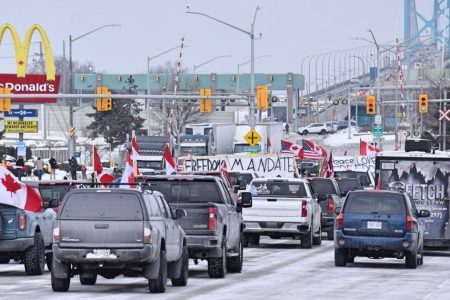Nearly every Canadian automotive supplier has ceased building parts for the time being due to the ongoing blockade at the Ambassador Bridge in Windsor, Ontario, according to the association that represents the sector.
“Almost no one is making parts today,” Automotive Parts Manufacturers’ Association President Flavio Volpe said early Friday morning. “It’s not art. If your customers aren’t making cars, you are not making parts.”
Protestors identifying themselves as part of the Freedom Convoy 2022 on Feb. 7 began blocking access to the international span that connects to Detroit. They, along with like-minded demonstrators currently occupying pockets of Ottawa, are demanding anything from the end of vaccine mandates to the ousting of Prime Minister Justin Trudeau.
“Today, the best advice I have for people illegally blocking the Ambassador Bridge is to go home,” Volpe said in a tweet Friday morning. “The immeasurable damage you have selfishly done to Canada will be shouldered by your fellow citizens who will be talking about you for the next 30 years.”
In a request for a court injunction to end the blockade, the APMA says the demonstrators had cost Canada’s auto industry $600 million through Thursday morning. It’s a number that increases by the hour. The injunction, which was filed in a Windsor court Thursday, is being sought by the City of Windsor and business groups, including the APMA and the Canadian Vehicle Manufacturers’ Association (CVMA). The hearing was adjourned until noon ET Friday.
The demonstration, which Volpe calls “a stunt,” is also leading some U.S. politicians to call for more U.S. protectionism in an effort to avoid future kinks in the supply chain. Canadian auto plants export between 80 and 90 per cent of the vehicles they build to the United States, which is Canada’s largest trading partner.
CVMA CEO Brian Kingston, who represents the interests of the Detroit Three in Canada, said his members have been affected by the blockade and lack of parts.
Stellantis told Automotive News Canada that its plants in Windsor and Brampton, Ontario., ran short shifts this week. Ford also cut shifts at its engine operations in Windsor.
Toyota on Thursday said it would idle all its Ontario operations for the remainder of the week. And Honda said it would idle at least one line of production Friday and warned downtime could be extended across North America.
“Due to border delays, Honda of Canada Mfg. in Alliston, Ont. is scheduled to temporarily suspend manufacturing on one production line during the day shift on Friday, Feb. 11,” the automaker said in a statement. All Honda automotive manufacturing operations in the U.S. are currently scheduled to run production on Friday, the company said. “As this remains a fluid situation, we are monitoring the disruption of transportation between Canada and the U.S. and will adjust production as necessary. Further production adjustments and delays are possible.”

